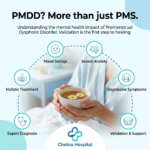Polycystic Ovarian Disease (PCOD) has become one of the most common hormonal disorders among women of reproductive age. It affects millions of women worldwide and often begins during adolescence. PCOD can cause irregular periods, unwanted hair growth, acne, weight gain, and sometimes even infertility.
Despite being so common, there’s still a lot of confusion and misinformation about what actually causes PCOD. Many women only focus on the symptoms, not realizing that PCOD is deeply linked to lifestyle, hormones, and genetics.
Let’s explore the real causes behind PCOD, understand how it develops, and what you can do to manage it effectively.
🧬 What Is PCOD?
PCOD stands for Polycystic Ovarian Disease. It is a condition in which a woman’s ovaries produce immature or partially mature eggs in large numbers. Over time, these eggs turn into cysts — small fluid-filled sacs — inside the ovaries.
This happens because of an imbalance in the reproductive hormones, especially an increase in androgens (male hormones). The hormonal disturbance affects ovulation — the process when the ovary releases an egg each month — which leads to irregular periods and difficulty in conceiving.
⚖️ Difference Between PCOD and PCOS
People often use PCOD and PCOS interchangeably, but they are slightly different.
- PCOD (Polycystic Ovarian Disease) is a hormonal imbalance where the ovaries produce many immature eggs that turn into cysts.
- PCOS (Polycystic Ovary Syndrome) is a more severe metabolic condition that affects multiple body systems, not just the ovaries.
PCOD is more common and manageable with lifestyle changes, whereas PCOS may require more medical intervention.
🌿 Causes of PCOD
The exact cause of PCOD is not yet fully understood, but a combination of genetic, hormonal, and lifestyle factors contributes to its development. Let’s break them down.
1. Hormonal Imbalance
Hormonal imbalance lies at the heart of PCOD. Normally, a woman’s body produces both female hormones (estrogen and progesterone) and a small amount of male hormones (androgens).
In PCOD, the ovaries produce more androgens than usual. This increase interferes with the normal development and release of eggs during ovulation. The result is multiple small cysts in the ovaries and irregular menstrual cycles.
Common hormonal changes seen in PCOD include:
- Increased androgens (male hormones) – leading to acne, facial hair growth, and scalp hair thinning.
- Elevated luteinizing hormone (LH) – which affects ovulation.
- Decreased follicle-stimulating hormone (FSH) – making egg development irregular.
- Low progesterone levels – causing irregular or missed periods.
These hormonal disturbances create a cycle where ovulation is delayed or doesn’t occur, leading to further imbalance.
2. Insulin Resistance
Insulin is a hormone that helps the body use glucose (sugar) for energy. In women with PCOD, cells often become resistant to insulin — a condition known as insulin resistance.
When the body can’t use insulin properly, blood sugar levels rise. In response, the pancreas produces more insulin. This excess insulin stimulates the ovaries to produce more androgens, worsening symptoms like acne, excess hair growth, and irregular periods.
Insulin resistance also makes it difficult to lose weight, which can further aggravate PCOD symptoms. Studies show that up to 70% of women with PCOD have some degree of insulin resistance.
3. Genetic Factors
Genetics play a significant role in PCOD. If your mother or sister has PCOD, your chances of developing it are higher. Researchers have found certain genes that may be linked to insulin resistance, hormonal imbalance, and ovarian dysfunction — all contributing to PCOD.
While genes can increase your risk, lifestyle choices often determine how strongly these genes express themselves. That means even if PCOD runs in your family, you can still reduce your chances through healthy habits.
4. Unhealthy Lifestyle
Modern lifestyle habits are one of the biggest reasons behind the rising cases of PCOD, especially among young women.
- Poor diet – High intake of junk food, refined carbohydrates, and sugary drinks can worsen insulin resistance and hormonal imbalance.
- Lack of exercise – Sedentary lifestyle contributes to weight gain, obesity, and poor insulin sensitivity.
- Stress – Chronic stress increases cortisol levels, which can disrupt the balance of reproductive hormones.
- Irregular sleep – Poor sleep affects metabolism and hormone production, worsening PCOD symptoms.
A balanced lifestyle with nutritious food, regular physical activity, and proper stress management can go a long way in managing PCOD.
5. Chronic Inflammation
Research has shown that women with PCOD often have low-grade inflammation in the body. This inflammation triggers the ovaries to produce more androgens, which can lead to heart-related risks and further hormone imbalance.
Unhealthy diet, pollution, and obesity all contribute to this chronic inflammation.
💡 Common Symptoms of PCOD
While causes explain the internal mechanisms, understanding symptoms helps identify PCOD early. Some of the most common symptoms include:
- Irregular or missed periods
- Excessive hair growth on the face, chest, or back (hirsutism)
- Acne and oily skin
- Thinning hair on the scalp
- Weight gain, especially around the waist
- Difficulty getting pregnant (infertility)
- Darkening of skin around the neck or underarms (acanthosis nigricans)
- Mood swings or depression
Every woman’s experience with PCOD is different. Some may have mild symptoms, while others face severe hormonal and metabolic issues.
🧘♀️ How to Manage PCOD Naturally
While PCOD cannot be completely “cured,” it can be effectively managed through lifestyle changes and medical support. Here’s how:
1. Eat a Balanced Diet
- Include whole grains, lean proteins, fruits, and vegetables.
- Avoid refined carbs, sugary snacks, and processed foods.
- Add foods rich in omega-3 fatty acids, like flaxseeds and walnuts.
- Stay hydrated and eat at regular intervals to maintain blood sugar levels.
A low glycemic index (GI) diet helps control insulin resistance and supports hormonal balance.
2. Exercise Regularly
Physical activity improves insulin sensitivity, reduces weight, and regulates hormones.
- Do at least 30–45 minutes of moderate exercise like walking, cycling, or swimming daily.
- Combine cardio with strength training and yoga for the best results.
Regular exercise also helps manage stress and improves mood.
3. Maintain a Healthy Weight
Even a 5–10% reduction in body weight can improve symptoms significantly. It helps regularize periods, improve fertility, and reduce the risk of diabetes.
4. Manage Stress
Stress triggers hormonal fluctuations that worsen PCOD. Try techniques like:
- Meditation and deep breathing
- Yoga and mindfulness practices
- Engaging in hobbies or outdoor activities
Getting enough sleep (7–8 hours per night) is also essential for hormone regulation.
5. Medical Management
In some cases, lifestyle changes alone may not be enough. Your gynecologist may prescribe:
- Oral contraceptive pills – to regulate menstrual cycles and reduce androgen levels.
- Metformin – to improve insulin sensitivity.
- Fertility medications – for women trying to conceive.
Regular monitoring and medical guidance are important to prevent complications like diabetes, heart disease, or endometrial problems.
💬 Can PCOD Affect Fertility?
Yes, PCOD can make it difficult for women to conceive naturally because of irregular ovulation or absence of ovulation. However, it doesn’t mean infertility is permanent.
With lifestyle correction, proper diet, and medical support, many women with PCOD conceive successfully. Early diagnosis and consistent follow-up with a gynecologist are key.
🌺 Long-Term Health Risks of Untreated PCOD
If PCOD is left unmanaged, it can lead to long-term complications such as:
- Type 2 diabetes
- High blood pressure
- High cholesterol
- Heart disease
- Endometrial (uterine) cancer
- Sleep apnea
- Depression and anxiety
That’s why timely treatment and preventive care are essential.
💖 Conclusion
PCOD is a complex condition influenced by multiple factors — hormonal imbalance, genetics, insulin resistance, and lifestyle. While you cannot control your genes, you can control your habits.
A balanced diet, regular exercise, stress management, and timely medical advice can make a huge difference. PCOD doesn’t have to define your life — with awareness and the right care, every woman can lead a healthy and fulfilling life.
If you notice symptoms like irregular periods, unexplained weight gain, or acne, don’t ignore them. Consult your gynecologist early, understand your hormonal health, and take the first step toward healing.













